Corrosion Technology Center: Providing Customized Corrosion Engineering and Testing
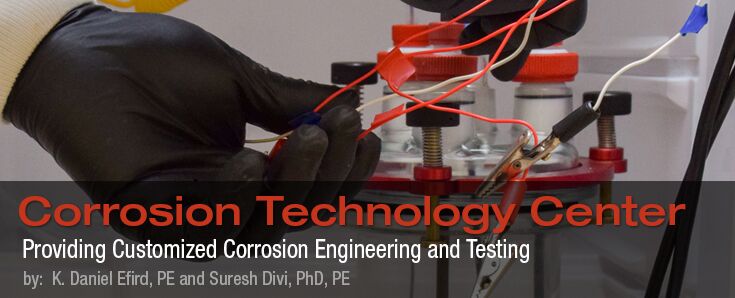
Corrosion happens. It can occur in virtually every aspect of every human endeavor, from food spoiling to cars rusting. Corrosion engineers remain at the forefront of the battle against this process. While a broad spectrum of advanced tools and techniques are now available to measure and mitigate corrosion, these tools must be applied appropriately to achieve the desired results. To quote C. Edeleanu, “It is simple to recommend that everything in sight be gold-plated. Any fool can do that. What is expected from the Corrosion Engineer is guidance on how near the precipice it is safe to go without falling over it.” Defining the location of the “precipice” is the ultimate goal of corrosion science and corrosion testing.
The prime directive of the Stress Engineering Services Corrosion Technology Center (SES/CTC) is to provide solutions to control the corrosion process, minimize corrosion damage, and define the corrosion precipice as accurately as possible. The SES/CTC also conducts customized research projects that include designing and conducting specific targeted studies or testing as requested by the client.
Standard Testing
Examples of standard corrosion tests used are:
ASTM – G31, G48, A923, G150, F2129
NACE – TM0177, TM0169, TM0115, TM0174, TM0284
SES/CTC personnel are experienced in conducting most ASTM and NACE standard corrosion tests. However, their primary focus is in duplicating as closely as possible the corrosion issues that individuals are experiencing.
Customized Testing
Customized testing includes the design, operation, and interpretation of innovative corrosion test methods, targeted to solve specific corrosion problems. By moving beyond standard testing, we are able to provide a broader range of tests designed for client applications.
Why Customized Corrosion Testing?
The only thing worse than no corrosion data is inappropriate corrosion data. Data obtained through customized corrosion testing have proven highly beneficial for clients, providing detailed fitness-for-purpose information.
One example is the use of nickel alloys in seawater systems offshore. When the demand for offshore titanium plate and frame seawater heat exchangers exceeded the supply, a major oil company wanted to define which nickel-based materials would be most useful. ASTM G48, the industry standard test, uses ferric chloride (a strong oxidizer) to determine pitting and crevice corrosion susceptibility of stainless and nickel-based alloys, but is excessively aggressive. SES/CTC proposed electrochemical testing based on ASTM G61 in an artificial seawater solution with hypochlorite. The customized test protocol simulated service conditions the alloys would encounter. It confirmed alloys that would perform acceptably in this service, but would be rejected by ASTM G48 testing.
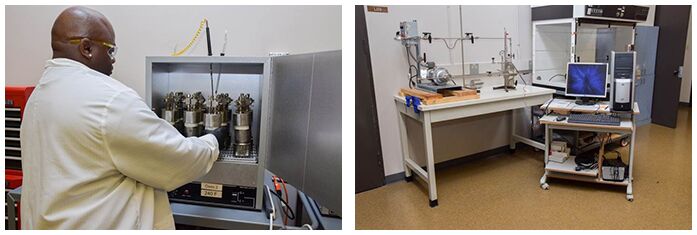
Customized flow corrosion testing (left) and inhibitor corrosion control testing (right)
Corrosion Testing Specialties
Customized testing requires development of multiple testing methods that, taken together, provide the desired results.
Test Method Tool Box
In preparing customized test protocols, a number of methods are available to generate the needed data. Examples of techniques employed to generate many of the various testing methodologies are:
- Crude Oil Corrosion Test Techniques
Unique methodologies evaluating corrosivity - Flow-Accelerated Corrosion Testing
Full range of flow regime tests available - Electrochemical Testing
Complete suite of electrochemical methods - Acoustic-Emission (AE) Test Monitoring
Used for monitoring the occurrence of environmental cracking, hydrogen migration, and coating failure initiation - Corrosion-Inhibitor Evaluation
Critical concentration and persistency included - Corrosion Under Heat-Transfer Conditions
Multidirectional heat-transfer corrosion effect - Corrosion in Controlled Low Oxygen
Coupon and electrochemical testing at ppb levels - Under-Deposit Corrosion Evaluation
Effects of specific solid deposits and interfaces, including FeS, on corrosion and inhibition - Corrosion Under Insulation (CUI) Simulation
Coupon, AE, and electrochemical procedures with controlled atmosphere - Crevice Corrosion And Pitting Susceptibility
Evaluation using coupon, electrochemical, and AE procedures - Galvanic-Corrosion Evaluation
Electrochemical potential and current procedures - Stress-Assisted Cracking (SCC, SSC, HE, Fatigue)
Including AE monitoring - Cathodic-Protection Requirements
Coupon and electrochemical evaluation - Coating Atmospheric and Immersion Testing
Custom designed environmental chambers, heat transfer Atlas cell, and AE monitoring
Examples of Customized Testing
Crude Oil Corrosion
In oil production environments, the composition of the crude oil has a significant effect on the corrosion of steel. The primary effects of crude oil on steel corrosion are (1) protectiveness of the corrosion product layer and (2) reducing the ability of water to wet the surface. Understanding these factors allows improved corrosion prediction. These effects are interdependent and directly related to the composition of the crude oil.
SES/CTC has developed customized testing methodologies to determine the amount of water needed to wet the steel surface for a specific crude oil. We can also qualify inhibitor efficiency with crude samples provided by the customer.
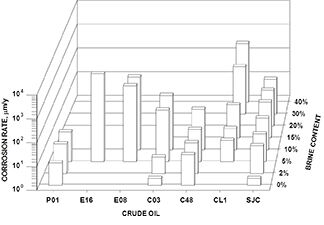
Different crude oils at different water cuts
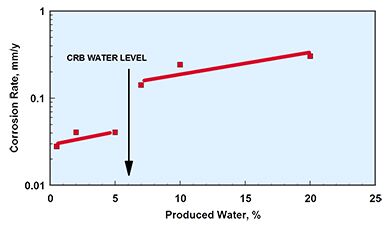
Crude Oil C48 CRB
Flow-Accelerated Corrosion
It is well understood that flow regime can have a significant effect on corrosion. Multiple pipeline models are available for predicting the degree of turbulence for various flow regimes and locations where water will separate out and cause corrosion. Simulation of the process flow regime during corrosion testing (stratified, turbulent, slug, entrained gas) is required to mimic these real-life process conditions.
Wall shear stress measures the interaction of a flowing fluid with a solid surface. It is a basic fluid/wall interaction phenomenon and not a function of the specific flow geometry. Wall shear stress on the test sample is the factor used to relate the corrosion results to process operating system corrosion. The experimentally measured corrosion rate is directly related to the expected corrosion rate in the process (as shown below).
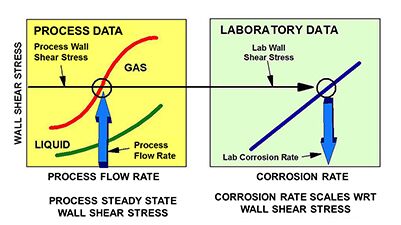
Corrosion Scale-up from Laboratory to Process
SES/CTC can generate test protocols for specific process environments that provide:
- Correlation of wall shear stress to process conditions
- Simulation of a full range of flow regimes as well as direct impingement and localized turbulence
- Evaluation of the effect of gas entrainment
- Determination of flow effects on inhibitors
The test method employed to study the effects of flow on the corrosion of materials must provide results that can be effectively correlated to any flow geometry.
Acoustic-Emission Test Monitoring
Acoustic emission can be used in corrosion testing to monitor the corrosion process and determine failure mechanisms in-situ. Two examples are coating temperature limits and environmental cracking initiation temperatures.
- Coating Testing
- Detecting failure temperature
• Evaluating cathodic disbanding
• Evaluating cold wall effect
• Determining failure mode - Environmental Cracking Testing
- Determining crack and/or pitting initiation temp.
• Testing full temperature range in single test
• Using controlled pH and/or O2 levels
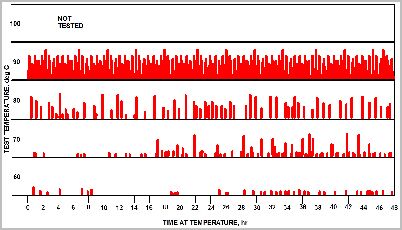
Performance of an amine epoxy tubular coating over a range of temperatures in a single test
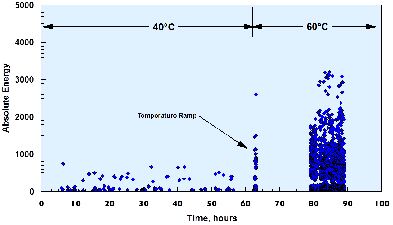
Stress corrosion cracking of 316L stainless steel in substitute seawater over a range of temperatures in a single test
** This article appears in the 2017 issue of Stress Talk **


K. Daniel Efird, PE – Subject Matter Expert, Houston Office
Suresh Divi, PhD, PE – Staff Consultant, Houston Office
Mr. Efird is an internationally recognized authority on corrosion prevention and control with 50 years of experience working with materials in the oil/gas, chemical, petrochemical, and marine industries. Dr. Divi is a corrosion engineer that provides corrosion engineering support for the oil and gas sector including designing and supervising in‐house corrosion research and testing projects, standard and customized testing.




Leave a Comment
You must Register or Login to post a comment.